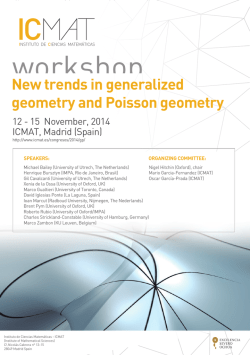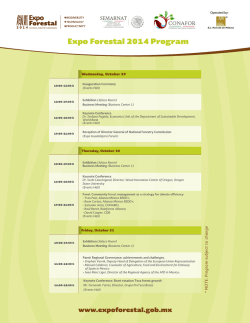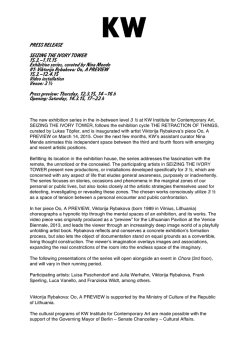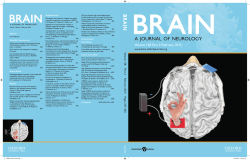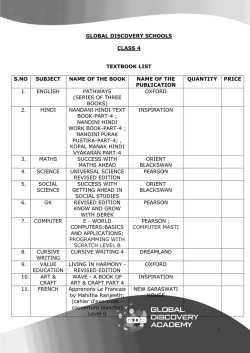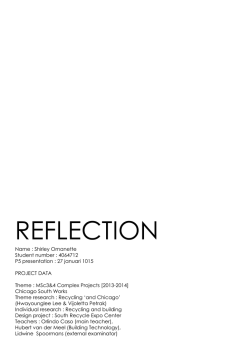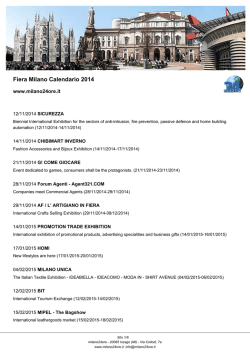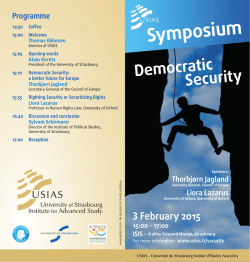
The Many Lives of Benjamin Disraeli: Fame
The Many Lives of Benjamin Disraeli: Fame, Legacy, Representations Interdisciplinary symposium convened by Sandra Mayer, with Megan Kearney Supported by: TORCH Celebrity Research Network and The Oxford Centre for Life-Writing Tuesday, 24 March 2015 Abstracts and Bio Notes Rob Bandy & Oliver Cox Working with Hughenden: Solving the Statesman’s Rooms This paper will explain the developing collaboration between Oxford University and the National Trust at Hughenden Manor. We will look at the case study provided by the ‘Congress of Berlin’ room to demonstrate the different ways in which Disraeli can be presented to a variety of audiences. We will then consider the ways in which this process has resulted in the property staff embarking on a number of exciting new projects. This collaboration is one part of the Thames Valley Country House Partnership (www.tvhcp.org) which links researchers in the University of Oxford with partners in the heritage sector. Hughenden Manor is one of twenty partner properties. Rob Bandy is Heritage Manager at the National Trust, Hughenden Portfolio. He studied Middle Eastern and Early Islamic History (BA Hons) at the School of Oriental and African Studies, London, followed by later Islamic and Ottoman History, as well as Historiography (MA, SOAS). His PhD research centres on the Long 19th Century and the creation of British identity through the excavation and exhibition of ancient Middle Eastern and Egyptian archaeology (SOAS). Before becoming the Hughenden Heritage Manager and taking care of the Disraeli Collection, he was for two years curator of a local museum. Oliver Cox is Knowledge Exchange Fellow at TORCH | The Oxford Research Centre in the Humanities. In October 2013 he created the Thames Valley Country House Partnership, linking the University of Oxford with the heritage sector to pursue collaborative projects. He has published on subjects including: Gothic Revival architecture, eighteenth-century landscape gardens, ‘Rule, Britannia’ and William Hogarth. Michael Flavin Venetia: Death of a Poet? Venetia (1837) is a transitional novel in Disraeli’s literary and political development. It is transitional because, in playing through an established tension in Disraeli’s literary work between the visionary and the expedient, Venetia, unusually for Disraeli, sides with the expedient more than the visionary. Published in the same year in which Disraeli entered the House of Commons as MP for Maidstone, Venetia identifies a need for pragmatism to temper idealism. Venetia is also of interest because of its representation of social class. At the height of his infamy, Lord Cadurcis, a major character in the novel and based upon Lord Byron, is set upon by a lower-class mob outside Parliament. The scene dramatises Disraeli’s outlook on class, and his faith in an hereditary aristocracy. A similar scene, on a larger scale, features subsequently in Disraeli’s most acclaimed novel, Sybil (1845). Venetia does not resolve the tension between the visionary and the expedient in Disraeli’s work, as the tension remains a structural feature of Disraeli’s novels, but in weighting the narrator’s sympathies more towards the expedient, Venetia articulates a more pragmatic position than had been the case in Disraeli’s previous novels, while maintaining his faith in an hereditary aristocracy and expressing fear of the disruptive and violent potential of the lower classes. Michael Flavin is Head of Curriculum Innovation at King’s College London. He holds a degree in English, two masters degrees (one in English and one in Education) and two doctorates (one in nineteenth-century literature and culture, and one in technology-enhanced learning). He is a Fellow of the Higher Education Academy. He publishes in the fields of nineteenth-century studies, and in higher education: his published books include a study of Benjamin Disraeli’s literary output, described by the Journal of British Studies as ‘helpful, insightful, and important. He does a wonderful job of making Disraeli seem real through the pages of his fiction.’ He was interviewed about his Disraeli book on BBC Radio 3’s Night Waves. Michael’s most recent publications include a review of Robert O’Kell’s book on Disraeli (Canadian Journal of History, 2014), and a study of Disraeli’s novel Tancred for the Encyclopaedia of Jewish Literature and Culture (forthcoming). Daisy Hay Mr and Mrs Disraeli: Places, People, Paper This paper focuses on the marriage of Benjamin and Mary Anne Disraeli in order to explore the way in which together, they remade themselves as the hero and heroine of a great romance. It discusses the way in which Disraeli’s public reputation was reshaped by his marriage, and it investigates how he made public the dramas of his private life for political ends. Building on work undertaken by the author for her recently published Mr and Mrs Disraeli: A Strange Romance, it pays particular attention to place and paper. It suggests that at Grosvenor Gate and at Hughenden the Disraelis created spaces synonymous with their dreams and ambitions, and it proposes that the complexity of their self-fashioning is revealed with particular richness in the papers Mary Anne Disraeli collected. Finally it argues that Disraeli’s marriage was a crucial factor in his long journey from political outsider to establishment figure, even though it confounded the expectations of the Victorian marriage market, and it traces the Disraelis’ joint journey from the social margins to a position in which they became, in the words of The Times, representative of ‘an essentially English union.’ Daisy Hay is the author of Young Romantics: The Shelleys, Byron and Other Tangled Lives (2010) and, most recently, Mr and Mrs Disraeli: A Strange Romance (2015). She is a lecturer in English Literature and Archival Studies at the University of Exeter, and an AHRC/ BBC Radio 3 New Generation Thinker. Dominic Janes Disraeli, Caricature and Queer Fashioning In the course of his career Benjamin Disraeli was periodically caricatured as an effeminate, most prominently in the pages of Punch. This talk will focus on a series of sketches produced by John Doyle (toned down for publication) which focus on Disraeli as a transgressor of gender norms. I approach this topic as part of a wider project on ‘queer fashioning’ which proposes that male social performance and the parody of those performances should be seen as interlinked rather than antipathetic phenomena. In particular I seek to build on the insights of Andrew Elfenbein which he first developed in ‘Byronism and the work of homosexual performance in early Victorian England’, Modern Language Quarterly (1993). In this article Elfenbein argued that to pose as an aristocrat and an aesthete was to stir up suspicions of sodomitical desire that were sufficient to attract social attention but not such as to threaten disgrace. This implies that there was a demand, a market if you will, for queer performances that enabled a route, albeit a risky one, to social celebrity. To what extent, therefore, can we read various caricatures as evidences of the reception of Disraeli as a man who troubled accepted norms not only of gender but also of sexual desire? Dominic Janes is a Professor at the University of the Arts, London, and a Reader in the Department of History of Art, Birkbeck, University of London. He works across British cultural history and visual culture, with a focus on sexuality since the later eighteenth century and has two upcoming books: Picturing the Closet: Male Secrecy and Homosexual Visibility in Britain (Oxford University Press, 2015) and Visions of Queer Martyrdom from John Henry Newman to Derek Jarman (University of Chicago Press, 2015). Megan Kearney ‘A Jew in his heart’: The Reception of Disraeli’s Judaism A mercurial notion of his Jewish identity has long dominated popular and historical perceptions of Disraeli. Historical scholarship has – especially in recent years – focused on his Disraeli’s Jewishness as a race. His Jewish appearance, his construction of himself as an elite Sephardi Jew, his manifold statements about the Jews as a superior race, the anti-Jewish slurs he deflected during political campaigns, and the unlikeliness of Disraeli gaining access to elite British political and social circles have all been discussed at length in recent work. These cultural studies have added invaluably to our understanding of Disraeli’s Jewish contexts. But they have not interrogated the extent to which Disraeli believed in the religious claims of Judaism, or how we might understand Disraeli as a nineteenth-century English believer in light of his Jewish background. This paper offers a few reasons for the historiographical foregrounding of Disraeli’s Jewishness, as opposed to his Judaism. It also suggests how we might begin to situate Disraeli on the spectrum of Victorian belief and religious expression. Megan Kearney is a D.Phil candidate in Theology at Keble College, Oxford. She is interested in the way faith, ecclesiastical, and literary expression changed and intersected in nineteenth-century Britain. Her dissertation offers new understanding of Disraeli’s religious thought. Helen Langley Scenes from Disraeli’s Extraordinary Life: Curating the Bodleian 2004 Exhibition and Widening Its Reach In the summer of 2002 work began on the Bodleian exhibition marking Disraeli’s bicentenary. The exhibition which ran from December 2003 to May 2004, presented a number of challenges, not the least of which was how to compress Disraeli’s extraordinary life story into eight exhibition cases using mainly documents from his own private papers. From the outset collaboration with other key contributors and resources – the exhibition designer; the National Trust; private donors of material; historians; and the Oxford Digital Library – was crucial. Drawing on the Bodleian’s collection of twentieth-century prime ministerial papers brought insights into styles of leadership and character traits which cut across boundaries of time and party. This paper revisits the exhibition, its relationship to the accompanying book and the expanded online exhibition released in 2005. Inevitably, given the constraints – Disraeli’s political archive includes more letters to him than by him, and a relatively small exhibition space – some aspects of Disraeli’s life were better represented than others but overall the snapshot approach achieved its aim. The reach of the exhibition was further extended by the inclusion of the online version in the BBC history website and, in 2008, by contributing to the new introductory films for Hughenden’s visitors. Helen Langley is a historian and curator and was until her recent retirement the modern political manuscripts curator at the Bodleian Library. She has published several articles, and lectures on historic houses and gardens. She is currently involved in planning seminars marking the UN’s seventieth anniversary. Sandra Mayer Pegasus and Carthorse: The Many Shades of Disraeli’s Celebrity Contemporary commentators regularly took note of the unusual alliance of creative artist and pragmatic politician in Disraeli’s career, the fact that ‘to the chariot of his mind are yoked Pegasus and a carthorse,’ as it was duly acknowledged in 1868 in a piece on ‘The Premier Novelist’ in London Society. Disraeli’s dexterous and life-long migration between literature and politics as two closely connected arenas of selffashioning and self-projection clearly challenged existing norms of categorisation and contributed to the elusiveness of his public image, which fed processes of myth-making and celebrification. This paper aims to assess the intersections of literary and political fame in Disraeli’s public image by specifically focusing on the reception of Lothair (1870) and Endymion (1880). The responses to the novels reveal the mutually formative impact of their author’s twin public personae of literary celebrity and celebrity politician and thus cast a spotlight on interrelations between literary marketplace, authorship, politics, media, and Victorian public sphere. While it will be argued that it was Disraeli’s dual public role of celebrated novelist and venerable statesman that crucially shaped his reputation as one of the ‘eminent Victorians,’ this paper also points to the celebrifying impact of Disraeli’s position as a social, ethnic, and intellectual outsider. All these manifestations of fame, it will be shown, dynamically interacted and colluded in the shaping of Disraeli’s public profile and eventually became mutually sustaining. Sandra Mayer is an Erwin Schrödinger Research Fellow (Austrian Science Fund) at the University of Oxford’s English Faculty and Wolfson College, where she works on a post-doc project that is situated at the crossroads of celebrity and authorship studies and focuses on Benjamin Disraeli as a literary celebrity and celebrity politician. She was awarded her doctorate by the University of Vienna for a thesis on the reception of Oscar Wilde’s plays on twentieth-century Viennese stages and is currently revising this work for publication. Jonathan Parry Tancred in Context Tancred remains one of Disraeli’s most understudied novels, even though it was published just after the Corn Law crisis of 1846 catapulted him to notoriety and has usually been celebrated along with Coningsby and Sybil as a famous trilogy. In recent years, it has begun to earn a place in writing about Disraeli, as more attention is paid to his deliberate identification with Judaism. In this paper I do not want either to dwell on that theme or to criticise it, but rather to suggest an additional layer of significance for the novel, by setting it in the context of the diplomatic events and religious debates of the 1840s. Tancred dealt with a contemporary political crisis in a real place (the Lebanon) and was demonstrably influenced by a range of contemporary discussions both about Islam (specifically Carlyle’s lecture of 1840 on Mohammed) and about evangelical activity in Jerusalem (specifically the Anglo-Prussian attempts to protect and ideally convert Palestinian Jews). The paper will introduce these contexts and ask how far they should alter our sense of Disraeli’s purpose in writing the novel at such a time. Jonathan Parry is Professor of Modern British history at the University of Cambridge and author of several books on Victorian Britain including a biographical essay on Disraeli republished from the Oxford Dictionary of National Biography. He is currently working on the role of the Near East in British politics and culture in the nineteenth century. Michel Pharand Rediscovering Disraeli – One Letter at a Time The Disraeli Project at Queen’s University in Kingston, Ontario, Canada was founded in 1975 and is the only research unit in the world wholly dedicated to the study of Benjamin Disraeli through his correspondence. After a brief history of the Project, I will provide an overview of our editing process. With examples from published and unpublished letters, I will explain some of the challenges we face in trying to annotate Disraeli’s letters: accurately dating incomplete, undated or partially-dated letters; deciphering Disraeli’s handwriting and that of his contemporaries (such as the notoriously illegible Queen Victoria); making sense of some of Disraeli’s cryptic memos; and attempting to weave a coherent narrative of events, day by day and often hour by hour, despite the countless missing letters we know (from internal evidence) that Disraeli wrote. In short, our work brings Disraeli’s private and public lives into focus: from his struggles with gout and his frustrations with inks, pens and paper, to his handling of contentious issues in the political arena. I will close with a summary of our recent efforts to digitize Disraeli’s 13,000 letters, all of which have now been verified against originals and transcribed, and are currently being uploaded into our online database. Michel W. Pharand is Adjunct Associate Research Professor of Arts and Science at Queen’s University, in Kingston, Canada. He holds a BA and MA in English Literature from the University of Ottawa, and a PhD in Comparative Literature from Penn State University, where he studied under Disraeli biographer Stanley Weintraub. After a teaching career that included posts at universities in the United States, Canada, Iraq and Japan, he began work in 2007 at Queen’s University as director designate of the Disraeli Project and became director in 2009. In addition to being the general editor of the ongoing Benjamin Disraeli Letters series, published since 1982 by the University of Toronto Press, he is general editor of the bi-annual SHAW: The Journal of Bernard Shaw Studies and advisory editor for Broadview Press and for ELT: English Literature in Transition, 1880-1920. Pharand is the author of Bernard Shaw and the French (University Press of Florida, 2000) and editor of Robert Graves’s The Greek Myths (Carcanet Press, 2001) and of a volume of Shaw’s letters, Bernard Shaw and His Publishers (University of Toronto Press, 2009). His most recent books include the last two volumes in the Benjamin Disraeli Letters series: Volume IX: 1865-1867 (2013) and Volume X: 1868 (2014). He and his research associate are now working on Volume XI: 1869-1873, which they hope to complete in 2015 and publish in 2016.
© Copyright 2026
